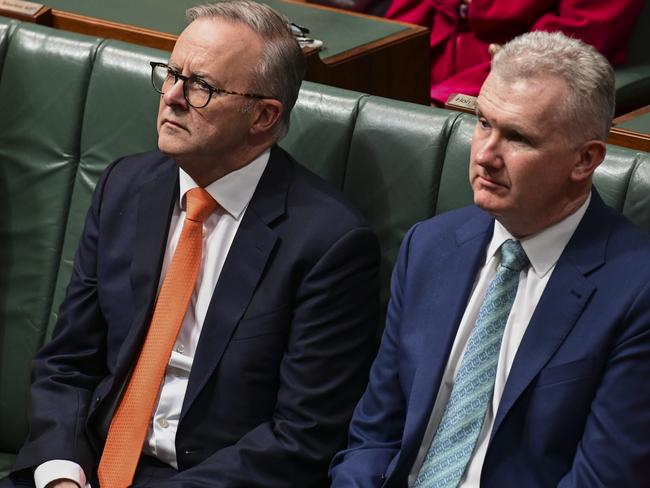Sometimes the outcomes are bizarre.
For example, unions want casual labour curbed because full-time employees are easy to organise, but it has suddenly becoming apparent that what they are really advocating for is a reduction in take-home pay for the hundreds of thousands of people currently on casual employment.
I will detail how this works later, but one of the reasons why casual work is very popular among those with big mortgages is that they end up with more cash in their pocket to meet mortgage payments.
The government has retreated.
A second agenda is the popular concept that everyone should receive the same pay for the same work.
In the public service there is an attempt achieve this by slotting everyone into grades and it is one of the reasons why productivity in the public service has been held back.
In the private sector, if enterprises do not pay experienced people with great skills at market levels then they will lose that person.
Another person might be doing the same job but without the same skills and experience, and so simply does not receive the same pay rate.
Trying to turn the private sector into a massive public service system would absolutely kill private sector productivity in Australia.
But there is one area where the unions are particularly anxious to attack – labour hire companies in mining projects.
Labour hire companies usually have different enterprise agreements to mining companies.
Some miners have their own labour hire company with a different enterprise agreement to the base miner.

It would be a disaster for the nation if in targeting this activity, the legislation expanded public service labour classification practices into the whole of the private sector.
Perhaps the most dangerous of the proposed industrial relations changes stem from proposals that envisage labour laws should conflict with the commercial contract laws of the nation.
Australia has some of the most advanced and clearest rules in the world to determine whether a person operating under contract, and so is subject to commercial law, or whether a person has an employment relationship so is part of the labour laws.
In the past the Australian Taxation Office tried to classify genuine contractors as employees and were made to obey the law by the courts and community pressure.
Nevertheless sometimes people claim to be the operating under contract but are clearly employees but the clarity of our rules, which have been backed by High Court determinations, is reducing such incidents.
The vast majority of self employed people who work under contracts know the commercial law rules and make sure they obey them.
Their activities are governed by the laws of contract and that includes regulation by the ACCC; unfair contracts; provisions fast payment and so on.
The relationship covers the whole ambit of long-established commercial law and is totally different from the rules that cover employment relationships.
We have not seen the legislation but the government seems to thinks self-employed people are selling themselves short and their commercial law contracts should be controlled by Fair Work Australia and be part of labour law.
If that is put into legislation it will be a total disaster for the nation because these are two very separate ways of generating commercial activity.
Australians understand the difference very well and when they hire a tradesperson they first obtain a tender price and the payment is made under the terms of the contract.
Australians entering into contracts don’t want to be trying to look after superannuation and holiday pay, which is part of an employment relationship.
The contractor incorporates those rewards into the tender price and it’s a system that generates great productivity because the contractor is always looking for better to perform the task.
In many ways it’s the essence of the nation.
The independent senators have an incredible responsibility to make sure that the governments embrace of union agendas does not throw into chaos the nation’s commercial contracting system.

And this is also important in the casual area because the casual pay rate is 25 per cent above the permanent employment level.
That effectively means casuals receive cash instead of holiday, long service leave and other full-time employment entitlements.
Casuals receive superannuation entitlements usually calculated on the higher casual rate.
Employment entitlements usually add about 20 per cent to the cost of a standard before tax wage so the casual is receiving an extra payment.
Employers are prepared to pay the extra money for the flexibility that casual employment delivers.
And many casuals prefer to have cash in their pocket rather than entitlements.
The great danger in messing with these laws is that casuals will receive employment entitlements and still receive their higher cash rewards – an effective double dip.
That would destroy casual employment in the nation.
Without seeing the legislation, if a person who has been working as a casual for six months and has been receiving very regular hours and wants to take a pay cut and become classed as permanent then they should be allowed to do so, especially as ending a casual arrangement is nearly as hard as a so-called “permanent” relationship.
Remember there is no job in the country that is permanent unless backed by specific legislation.
As public servants in debt-ridden Victoria are discovering, they too can be retrenched if a government borrows too much money.








Employment Minister Tony Burke and his close union associates are getting themselves into a terrible tangle as they pursue left-wing industrial relations agendas in a commercial society that needs productivity increases to lift the level of wages.